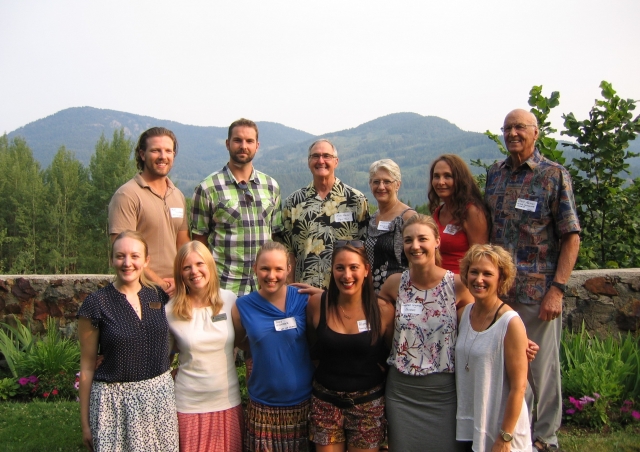Medical Training in Rural Areas: An "Exciting New Development" says Dr. Hume
New programs are introducing medical students and young doctors to the joys and challenges of practicing medicine in rural areas. The advantages go both ways: the medical students and new doctors get training in managing real-life situations with the facilities and support available in small communities; and the communities benefit from having young doctors learning the joys of rural living, settling into the communities, and becoming more likely to make their lives here. Rossland, Trail and Nelson are among the several communities benefiting from these innovations in medical training.
A joyful gathering of health professionals, community leaders, medical students and new doctors met on Monday, July 6, at the home of Drs. Cheryl Hume and Ralph Behrens, to celebrate the new “distributed training” programs and to warmly welcome their participants. Dr. Hume is the Director of University of BC (UBC) Clerkships and the Residency Program for the Kootenay Boundary; she very kindly provided a wealth of information about medical training and the new programs. She expects the programs to “mitigate the shortage of doctors” in remote and rural communities, as the programs will “provide significant opportunities for rural physician recruitment and retention.”
Excitement and enthusiasm radiated from everyone there. Rossland Mayor Kathy Moore said, “I am delighted to meet the new arrivals! This program will go a long way to introduce our wonderful area to new doctors interested in practicing in smaller, more rural environments. I really appreciate all the work that Dr. Hume and her team has done to make this program a reality.”
Being a medical student or a new doctor doing her or his residency in a rural community not only provides on-the-ground training for practicing medicine remote from major centres, but can also open up a world of possibilities for a healthier and more satisfying work-life balance.
The Programs:
The Integrated Clinical Clerkship (ICC) program started in 2010. It enables some medical students to do their third year of medical school in rural medical offices and hospitals; it’s where their academic training first meets real-life situations. There are six sites in BC available for the ICC program: Trail, Vernon, Chilliwack, Duncan, Fort St. John, and Terrace, and they can handle about 23 ICC students altogether.
Currently, there are four medical students each spending that third year in the Kootenay Boundary, getting their first real taste of clinical and hospital experience. Each student will work with the doctors in her or his hosting clinic, and with all the specialists at both the Kootenay Boundary Regional Hospital in Trail and the Kootenay Lake Hospital in Nelson. UBC has set up videoconferencing facilities to enable Trail and Vernon to work together to provide students with a richer learning experience, and will enable training to be exchanged between Trail and Nelson as well.
After completing their year of clerkship, the students will return to their UBC Faculty of Medicine “home” site — at UBC in Vancouver, or at UNBC in Prince George, or the UBC medical school Victoria, or UBC Okanagan in Kelowna — to compete their fourth year of medical school and earn the right to be called “Doctor.” Then, doctors choosing family medicine must complete two years of medical residency; those choosing other specialties must complete longer residencies — usually four years.
The Rural Family Medicine Residency Program has just begun. Four fresh new doctors are starting their required two-year residency in our area, in family medicine; two are beginning in Trail, and two are beginning in Nelson. The residents will trade places, and will also spend time in smaller centres such as Christina Lake and Grand Forks, Nakusp, Castlegar and Salmo in order to experience several different communities and the range of facilities and specialist support available in each.
Residents will get interdisciplinary training and will be better prepared to take on practice in rural areas after becoming familiar with several rural communities and their medical facilities — and limitations.
The Medical Residents:
Dr. Alana Benes (rhymes with “Venice”) and Dr. Mark Szynkaruk (“sin-care-ik”) will be starting their residencies in Trail. Dr. Benes will work with Drs. Aiken and Tucker at the Riverside Family Medicine Clinic in Trail, while Dr. Szynkaruk will work with Drs. McCoid and Behrens at the Beaver Valley Clinic in Fruitvale.
Dr. Szynkaruk wants to be a highly competent rural family physician. He did his undergraduate degree in biochemical engineering and completed his MD at the University of Toronto. He has a particular interest in access to health and the determinants of health, particularly socioeconomic status. He enjoys developing evidence-based approaches to medical problems. He likes camping, hiking, cycling, snowboarding, yoga, and various sports, as well as gardening.
Dr. Benes completed both a degree in Medical Laboratory Science and her MD at UBC. Her present medical interests lie in obstetrics, women’s health and emergency medicine, as well as sustainable medical programs in the developing world. She enjoys a healthy lifestyle that includes running, cycling, yoga, weightlifting and other sports, and indie music.
Dr. Gretchen Snyman and Dr. Gabe Krahn will begin their residencies in Nelson, under the auspices of doctors at the Kootenay Medical Centre and the Nelson Medical Clinic, respectively. Dr. Krahn enjoys hunting, fishing, hockey, hiking, camping, and weightlifting; Dr. Snyman likes running, spinning and yoga, as well as good food and cooking.
Collaboration and Community Support:
The distributed medical training programs were developed by collaboration between UBC and a group of local physicians and are well supported by health care workers, Interior Health Authority (IHA), the Selkirk College pre-med program and the Divisions of Family Practice (a provincial organization advocating for primary health care).
The Lower Columbia Community Development Team (LCCDT) recognizes the value of the programs, and the medical residents in our communities, and arranged for “schwag bags” containing a variety of donations from a large selection of local businesses to welcome the young doctors, and to enable them to taste some of the many advantages of living in the Kootenay Boundary. Judging by the expressions on their faces, the young doctors were delighted with the offerings. The LCCDT was also instrumental in obtaining a grant that will go toward assisting with accommodation (for two years) to make life less complicated for this first batch of cash-strapped and probably debt-burdened medical residents. During those two years, community members will be seeking a more permanent solution to the problem of decent but affordable accommodation for these valued visitors, some of whom could possibly become valued permanent neighbours.
Please join the entire local medical community and the Rossland Telegraph in celebrating this new approach to medical education, and in welcoming our medical students and young doctors-in-training.























Comments